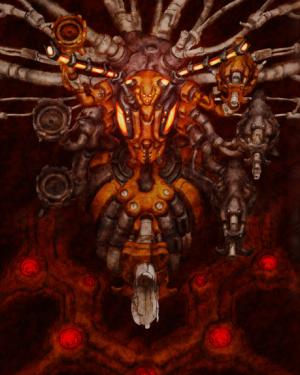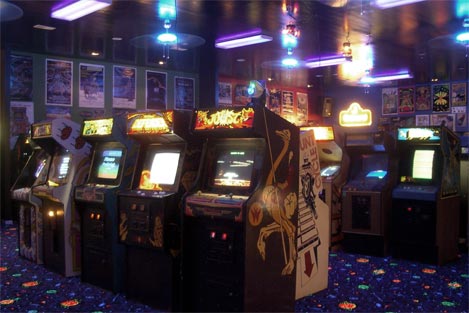
If games should reflect real life in terms of consequences – and, from my perspective, it’s essential that it does give us consequences in a real, rather than narrative, sense – then there must be problems presented to the player in a game. This, however, brings us to a new discussion – how do we distinguish between good and bad difficulty? We may say a poorly designed game has difficulty that is, in its own way, “cheap” or “unfair”. Usually, this isn’t used in the correct sense, being little more than a placeholder for personal feelings (e.g., “I don’t like X; therefore, X is cheap.”) when it may become an essential element of the game’s design. Few players fail to note this, precisely because we no little to nothing of the video game’s origin.
If there was ever a common complaint lobbied against games, it’s the accusations of a system seemingly stacked against the player – but this has been a constant element of the medium from the beginning! We can see this in a variety of places, but that complaint has been leveled at the arcade most of all. Arcades games are tough, granted. They are, by their very nature, designed with difficulty in mind. Arcade operators want to make money off you, and the easiest way to perform that functions comes from games that assault a player quickly and painlessly. Fighting games do this job for them, as highly competitive atmospheres mean a player will be automatically destroyed upon entering such an establishment. In Japan, the arcade has not died – it continues to thrive, even though they have the blessing of truly functional online play. You might ask yourself: why is this?
Have you seen how much a modern system costs? It’s not just the game console or PC gaming rig, but the monitor/HDTV, the surround system, the cables, and the joystick/controller. That’s all going into the cost of, say, buying myself a CAVE shooter. I need a joystick that controls well and a TV with no input lag, and a host of other technical issues. To have a truly great experience with a game at home, money’s a problem. But, and here’s the key, spending all this money merely gives you the ability to play at home. You can’t actually recreate the arcade environment because you’re not forced into the business model.

See, there’s an unwritten rule in Japanese arcades that people play with one token and that is it. That might seem weird until you think of it as a cost-saving measure. Arcade players know that the operators want to take their money. Operators know that players keep becoming better and better at the games. Both of them deal in a sort of virtual arms race to the top, wherein skill might not overcome an obstacle in a game – that hasn’t happened yet. The one-credit rule makes players spend their time wisely – they play the game to the best of their ability, learn the mechanics in their innermost depths, and then defeat the challenge laid before them. Out of politeness (hey, it’s an arcade, people wait for things and it’s rude to hog a machine), they give up the machine after they lose. And that’s after losing at something like this:
Difficulty to reconcile? To a Western audience, probably. But there’s an appeal to these games, and it’s not solely because it points at some seemingly insurmountable challenge and says “just try me”. I don’t think it’s solely an ego problem, either – certainly everyone has a desire to become better at any particular task (I would hope!), and that’s not just for bragging rights.
At some level, all difficulty in a game stems from some arbitrary challenge. It might be a puzzle (box pushing or whatnot), a scoring system (how do I get the highest score?), fast and dangerous enemies, sudden threats barreling out of the sides of the screen, or the inevitable spectre of death (for games where you can actually die). The developers knows this; they, then, must simply pick what kind of adversity to which they want to subject the player. Do they want people to play the game with little to no learning curve, having them waltz their way through some beautiful aesthetic landscapes? Then the game won’t be very difficult. Do you want to force the player to memorize levels so that they can survive and get the highest score possible? Then the game will represent something extremely hard to finish. That just goes for single player games, though; we also have a host of multi-player offerings on tap at any time.
To be overly reductive, games hold their relative difficulty level in the very fabric of their design. Memorization, for example, isn’t a skill held by everyone; some people hate memorization and prefer a free-flowing game style. Others really enjoy breaking the mechanical underpinnings on which a game rests, scrutinizing it for all to see. Just taking a cursory look at GameFAQs, you can see that people study game exhaustively, even beyond the point where said game has any popularity with the gaming public.
Here’s the kicker, though: no matter how the game’s designed, or what hoops it wants you to jump through, no game has “cheap” or “unfair” difficulty. Well, barring that of horrible glitches or bugs – that’s a different issue. Glitches and bugs may be found, but that doesn’t mean they were intended. Some become part of a game’s iterative progress (Street Fighter’s combos), while others mess up a game’s balance (Bayonetta’s Odette/Col. Kilgore Rocket Launcher combo – seriously, go look it up). Of course, once it’s released (and barring patches or hotfixes), all’s fair in gaming land. The rules exist as a solid entity, and for many years games didn’t have “patching” to fix problems – you dealt with the issue/glitch/unfairness on hand. Still, game’s aren’t unfair – they simply have a higher learning curve or intend a forced learning process (possibly unintuitively) so you will reach the goal. Potentially, these become time-consuming and require good reflexes or brain power, but if there’s a will there’s also a way.

The competitive drive in any style of game always remains paramount – the challenge is possible to clear. Yet, even through this process (which may involve hard times), the challenged competitive player is also having a great deal of fun. Think of it in this sense: in a fighting game, you train hard to understand the mechanics. There’s a lot that goes into not only playing well, but outsmarting your opponent. The mechanics only go so far if both players equally master the game’s underpinnings – the mindgames makes up the majority of high level play. Because of this, playing a fighting game really isn’t very fun at lower level play because…well, you have no idea what you’re doing, and it’s horrible when you face someone who does. How many times have I been pummeled by someone of a greater skill level? Still, you work at it, and work at it, and work at it until you understand what’s going on in the meta-game.
In the same way, I think Call of Duty players do this without realizing it. That’s why Prestige remove perks and all their advantages that they gained – their skill isn’t because of the time they grinded out, but because their actual skill has increased over time. That discipline in playing every day for whatever amount of time actually improves the game, makes it more fun, and ultimately gives you the deeper nuances of the game’s design. When someone knows the exact weapons to use, the exact hiding spots, the reload speed and the ammo clips, weapon locations, and all these various nuances, they’re breaking down the game into its essentials. Even if I’m not a particular fan of CoD or its ilk, I can see why a competitive community has formed around it – it’s the perfect game for that kind of competition.
Claims of “cheap” or “unfair” really mask a deeper complaint – the game isn’t holding my hand! Something wrong! I need a tutorial box that tells me where to go, or what to do, or something that finishes the game. What gamer hasn’t had issue with these incessant tutorial boxes? Who doesn’t complain about the modern Zelda game – do I really need the game to hold my hand and tell me everything twice for up to six hours? Frankly, I find it absolutely maddening . Why do we put up with these problems just for accessibility and mainstream success? Instead of giving a world to explore or a challenge to find or a puzzle to conquer, designers use every tool in their power to prevent the player from getting lost.
Let’s make this clear: if your game needs a dialogue box to tell me where to go, your game design failed. Simple as that. Designing a game with the player in mind strikes a much different chord – you must think how the player will think, what he will attempt, and how he will go about in your game’s mechanics. That’s not how games work today; instead, they retain the same tropes while augmenting as many worthless elements as possible to disguise this lack of clear design – but putting lipstick on a pig doesn’t change the fact that it’s a pig. It salutes the nostrils with its foul stench. Why can’t we just trust the player to figure out whether he’ll like the game purely by intuition? This fear of the player continues. We cannot stop holding their hand. We must keep them on the course. In doing so, we foster people under a law who cannot function without the comforting sight of a mini-map or a magical text box that tells you what to do.
We can see a similar situation in Malachi. The priests of Malachi’s time (unknown, unfortunately) were depriving God of the proper offerings – instead, they would spend it on other things, or give Him bad offerings. Then, they would proclaim that God wasn’t listening when they weren’t listening in return! It’s not always about social justice issues – in that time, at least, God demanded the sacrifice of the best animals – couldn’t that go to feeding the poor? What a weird thing for the social justice Gospel to consider: how could God require such a thing? That’s an interesting idea to consider: is Christianity really all about helping the poor? Certainly, a part of the faith involves helping the poor and oppressed, but to what degree? Does it say anywhere that we must give them a life of infinite comfort and continually coddle them until their insular perspective prevents their proper functioning in society? If so, how can they be truly free if they are dependant? The Apostolic Mandate exists for a reason: “If a man will not work, he shall not eat.” Even the itenerant apostle Paul was a tent maker. He supported himself and never asked for fund for his own journeys.
Rather, I would find a quite different message: we obey God, yes, but that doesn’t mean life becomes easy. We, instead, voluntarily take ourselves to the woodshed for a righteous spiritual beating. We hold ourselves to a higher standard. We rely on God only because we cannot rely on ourselves, and our constant fears and failings remind us of that fact. That’s not the mind of a rational person, you might say – well, it isn’t, really. Who is to say what is rational, and what is not? What we can do, however, is pick ourselves up and learn from our failures. We can make mistakes and learn from said mistakes. Instead of doing the opposite of what God desires. Obey God, and test Him, for it says in Malachi 3:
8 “Will a man rob God? Yet you are robbing Me! But you say, ‘How have we robbed You?’ In tithes and offerings.9 You are cursed with a curse, for you are robbing Me, the whole nation of you! 10 Bring the whole tithe into the storehouse, so that there may be food in My house, and test Me now in this,” says the Lord of hosts, “if I will notopen for you the windows of heaven and pour out for you a blessing until it overflows.
Don’t rob God. Do the work. Take responsibility. In video games, we have lost the responsibility for ourselves. We let the game take us through the motions, and don’t take the time to learn the game’s subtle nuances. Thus, developers spend less and less time making a game that, really, who’s going to pay attention to the mechanics anyway? Bombard me with graphics and story and sound, and forget the game. Coddle me and comfort me.
That can’t be how games should be. A world without failures isn’t a world at all; it’s a farce. Representative of pride, arrogance, fear, and success without hard work. That’s quite a shame. How do we fix this?
